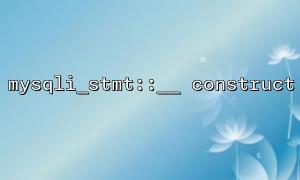SQL Injection is one of the most common security vulnerabilities in web applications. Attackers exploit it by injecting malicious SQL code into queries to gain unauthorized access to databases. To prevent SQL injection, developers must implement various measures to ensure query safety. In PHP, the mysqli_stmt::__construct method serves as a powerful mechanism for using prepared statements, helping to effectively guard against such attacks. This article explores in detail how mysqli_stmt::__construct plays a vital role in preventing SQL injection.
mysqli_stmt::__construct is a method provided by the mysqli extension in PHP, used to create a new prepared statement object. Unlike standard SQL queries, prepared statements allow the separation of SQL logic and data, which is key in preventing malicious code injection. By using prepared statements, developers can pass the SQL structure and data separately to the database server, reducing the opportunity for users to manipulate query logic.
SQL injection attacks typically involve inserting malicious SQL code into input fields. For instance, imagine a login form accepting a username and password, and using the following query to validate credentials:
<span><span><span class="hljs-variable">$sql</span></span><span> = </span><span><span class="hljs-string">"SELECT * FROM users WHERE username = '<span class="hljs-subst">$username</span></span></span><span>' AND password = '</span><span><span class="hljs-subst">$password</span></span><span>'";
</span></span>If the attacker enters the following in the username field:
<span><span><span class="hljs-string">' OR '</span></span><span>1</span><span><span class="hljs-string">' = '</span></span><span>1
</span></span>The resulting query becomes:
<span><span><span class="hljs-keyword">SELECT</span></span><span> </span><span><span class="hljs-operator">*</span></span><span> </span><span><span class="hljs-keyword">FROM</span></span><span> users </span><span><span class="hljs-keyword">WHERE</span></span><span> username </span><span><span class="hljs-operator">=</span></span><span> </span><span><span class="hljs-string">''</span></span><span> </span><span><span class="hljs-keyword">OR</span></span><span> </span><span><span class="hljs-string">'1'</span></span><span> </span><span><span class="hljs-operator">=</span></span><span> </span><span><span class="hljs-string">'1'</span></span><span> </span><span><span class="hljs-keyword">AND</span></span><span> password </span><span><span class="hljs-operator">=</span></span><span> </span><span><span class="hljs-string">'$password'</span></span><span>;
</span></span>This bypasses authentication and returns all data from the database, posing a severe security risk.
Prepared statements prevent SQL injection by separating the SQL query structure from user input. When using mysqli_stmt::__construct, the structure of the query is sent to the database and parsed in advance. The actual values are then bound to the query later. This isolation ensures user input cannot alter the query logic.
With mysqli_stmt::__construct, all variables in a query are passed as parameters rather than being embedded directly in the SQL string. For example, a prepared statement might be created like this:
<span><span><span class="hljs-variable">$conn</span></span><span> = </span><span><span class="hljs-keyword">new</span></span><span> </span><span><span class="hljs-title function_ invoke__">mysqli</span></span><span>(</span><span><span class="hljs-variable">$host</span></span><span>, </span><span><span class="hljs-variable">$username</span></span><span>, </span><span><span class="hljs-variable">$password</span></span><span>, </span><span><span class="hljs-variable">$dbname</span></span><span>);
</span><span><span class="hljs-variable">$stmt</span></span><span> = </span><span><span class="hljs-variable">$conn</span></span><span>-></span><span><span class="hljs-title function_ invoke__">prepare</span></span><span>(</span><span><span class="hljs-string">"SELECT * FROM users WHERE username = ? AND password = ?"</span></span><span>);
</span></span>Here, the question marks (?) act as placeholders. Actual values are later bound using bind_param:
<span><span><span class="hljs-variable">$stmt</span></span><span>-></span><span><span class="hljs-title function_ invoke__">bind_param</span></span><span>(</span><span><span class="hljs-string">"ss"</span></span><span>, </span><span><span class="hljs-variable">$username</span></span><span>, </span><span><span class="hljs-variable">$password</span></span><span>);
</span></span>In this setup, the database no longer treats $username and $password as part of the query. Even if a user inputs malicious SQL, it’s processed strictly as data, not as query logic.
When calling bind_param, the developer must specify the data type of each parameter. For instance, "ss" indicates both $username and $password are strings. This type enforcement ensures that input is always handled in the correct format, adding another layer of protection. Even if special characters or malicious code are entered, the database processes them as plain strings.
Beyond preventing SQL injection, mysqli_stmt::__construct and prepared statements offer additional security benefits:
Prevent Data Leaks: Sensitive data, such as passwords, is not embedded in SQL strings, reducing the risk of exposure in logs or error messages.
Improved Performance: Prepared statements can be reused. For queries with the same structure, only the parameters change, reducing compilation overhead and increasing efficiency.
Stronger Error Handling: Prepared statements enforce consistent query syntax, minimizing risks related to malformed queries or user input errors.
mysqli_stmt::__construct plays a critical role in preventing SQL injection. By separating query structure from user input, it eliminates the possibility of users altering query logic. Combined with strict data typing and performance benefits, prepared statements significantly enhance web application security. In modern PHP development, using prepared statements is strongly recommended to protect against SQL injection threats.
Related Tags:
mysqli_stmt SQL


